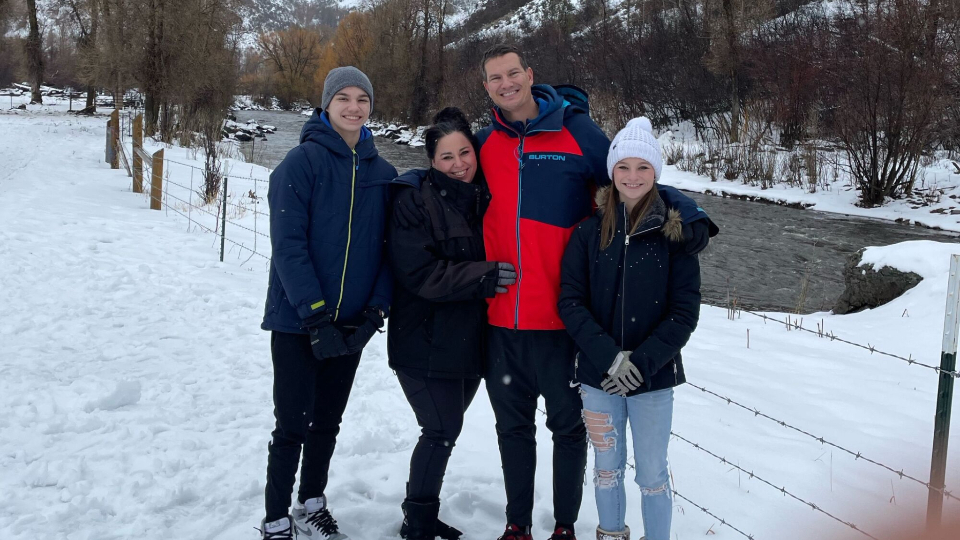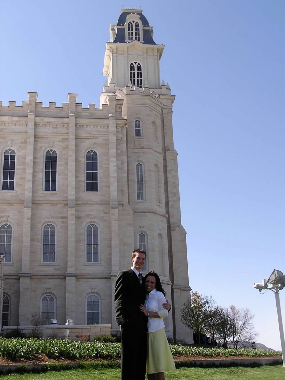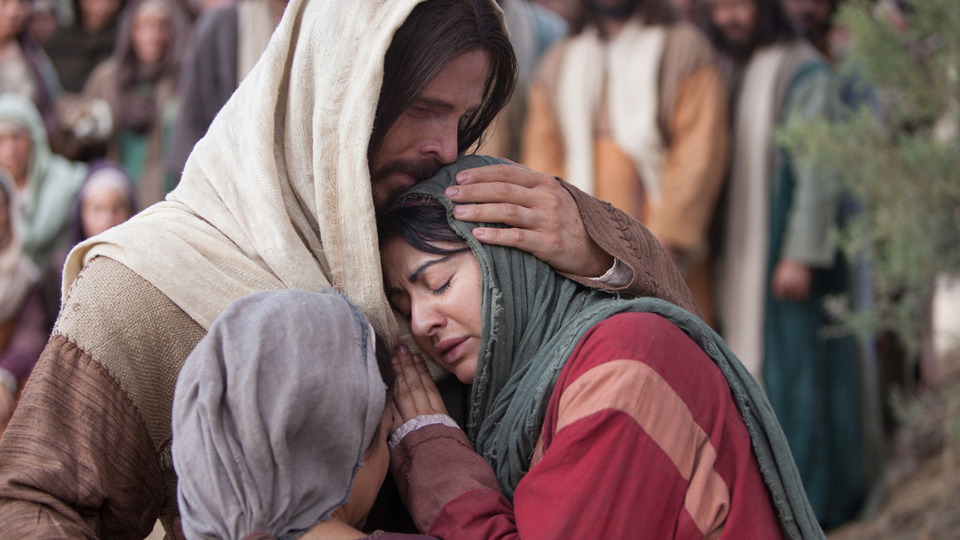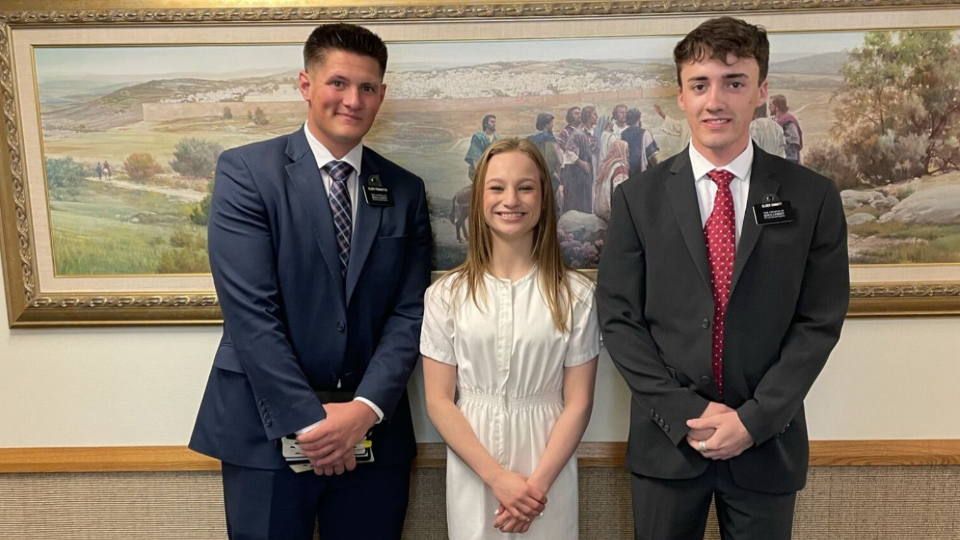This story appears here courtesy of TheChurchNews.com. It is not for use by other media.
By Mary Richards, Church News

return-to-faith
From left, Braeden, Michelle, Brock and Kailey Randall visit Park City, Utah, on Dec. 31, 2022. The Randalls spent 10 years away from The Church of Jesus Christ of Latter-day Saints before returning in early 2023. Photo provided by Michelle Randall, courtesy of Church News. All rights reserved.Seventeen-year-old Kailey Randall had been struggling through some emotional challenges, when, at the invitation of a friend, she listened to a full-time missionary speak about the Atonement of Jesus Christ.
She said she felt as if God Himself was reaching out to her and telling her everything she needed to know — she felt the Spirit in a way she had never felt before.
Kailey told her mother, Michelle, “I have never before felt like God loved me. But at this moment right now … I know that He loves me. I just know it.”
When Michelle Randall saw this change in her daughter, it reinvigorated her love for the gospel of Jesus Christ — the gospel she and her husband Brock had left behind 10 years before because of various questions and concerns.
Brock Randall reached out to their bishop in Kaysville, Utah, who showed up, sat on their couch and listened to them. And the Randalls began listening to the Spirit.

return-to-faith
Brock and Michelle Randall on their wedding day, April 14, 2005, in the Manti Utah Temple. The Randalls spent 10 years away from The Church of Jesus Christ of Latter-day Saints before returning to their faith at the beginning of 2023. Photo provided by Michelle Randall, courtesy of Church News. All rights reserved.Earlier this year, the Randall family returned to The Church of Jesus Christ of Latter-day Saints.
When Brock Randall was asked why he is back, he said, “Because I want to be close to God again.”
Feeling close to God and reconnecting with Him — especially through prayer — restores people’s faith. A new study from Brigham Young University published in Pastoral Psychology found out that people returned to faith when they experienced a reconnection in their relationship to God.
Jessica Zurcher, an associate professor in BYU’s School of Communications and the study’s co-author, explained that nearly 80% of those in the study said they still had not resolved some of the questions or concerns they had — “but their personal connection with God trumped their disbelief.”
Reasons for Returning to Faith
Zurcher said the researchers decided to do the study when they noticed a significant gap in the literature about why people decide to return to religion.
“There is a lot of research out there on faith, the triggering events for a faith crisis, why people decide to leave religion, topics that push people away, the process of a faith crisis, etc, but there’s not much on faith restoration,” Zurcher said.
“To our knowledge, ours is the first study to really explore this aspect of a faith crisis, and we felt this is an essential piece in understanding the faith crisis journey.”
Zurcher said whatever reason triggered someone leaving, the majority of the participants experienced a reconnection in their relationship to God through individualized narratives that resonated with them.

jesus comforts mary martha
Jesus Christ comforts Mary and Martha after the death of their brother Lazarus. 2023 by Intellectual Reserve, Inc. All rights reserved.Each of the narratives included aspects of the following:
- God’s existence.
- Talking with God connects a person to Him.
- God’s love for all people.
The study found four types or groups of narratives in the data, although they are not inclusive, Zurcher said.
1. Resilient God Seekers
Resilient God seekers overcame their faith crisis by clinging to the belief and trust that, although they did not understand the reasons behind the difficulties they faced, their struggles were part of God’s plan, said the study.
As they sought answers and help, they brought their struggles directly to God. One participant said, “I learned that God will allow us to struggle so we can learn and grow.” Another said her struggle was “not an accident, it’s not a mistake. ... I came to realize that God had a purpose for me.”
Another added, “Now, looking back, I can see God’s love and provision each step of the way. Sometimes it’s not until we’ve gone through it that we see that, ‘Wow, God, you were really there the whole time.’”

return-to-faith-3.jpg
Kailey Randall, center, stands with Elder Ronald Pennington, left, and Elder Devin Dimmitt, right, full-time missionaries from the Utah Layton Mission, at her baptism in Kaysville, Utah, June 4, 2023. Elder Pennington’s teachings were the catalyst for Kailey’s parents returning to The Church of Jesus Christ of Latter-day Saints. Photo provided by Michelle Randall, courtesy of Church News. All rights reserved.2. Self-compassionates
Self-compassionates focused on the realization that God’s love for them and their loved ones is perfect, regardless of their struggles, shortcomings, doubts and mistakes, said the study. They worked to restore their relationship with God by attending religious services and avoiding negative influences.
One participant said, “I think the thing that resolved my own faith crisis the most was doing the activities that led me to realize that I am [truly loved].”
People in this group realized that they could overcome any struggle through their relationship with God — and if they would slow down, God would help them along the way. Said one participant, “That’s the biggest revelation I got from all the changes that I’ve done, is that God loves me and how much He loves me. It’s a feeling I didn’t even comprehend before I fell away.”
3. Marathon Runners
These participants dealt with their faith crisis through maintaining a slow and steady pace — like a person running a marathon. Their struggles were also more personal and private.
They felt that God was central to overcoming their faith crisis, but it was in the little things over time. One participant said, “It wasn’t like one message — like people see a flower or a butterfly or something like that. Nothing like that happened. It was just a lot of activity piled up.”
Another said, “I don’t think I had anything that dramatic happen to me. Instead of one event happening, it was just being welcomed into a faith community.”
4. Scripture Seekers
Scripture seekers believed the best place to find peace, healing and answers was through God’s word.
One study participant in this group said, “I prayed so hard and still continued believing the scriptures. I remember reading in Matthew 7:7, ‘Ask, and it shall be given unto you.’ God does answer my prayer.”This group also was helped by the support, encouragement and love of their religious leaders and community. Said one, “This experience helped me realize, ‘It’s OK to ask for help. It’s OK to tell people ... I can’t do this by myself.’”
And another shared how a friend had a prompting to reach out to her: “I think that was when I knew God was aware of what was happening in my life.”
Many also felt that the purpose of their faith crisis was specifically to help others.
When Brock Randall was asked why he returned to the Church of Jesus Christ, he gave two reasons — one was to be close to God again. The other: “Because I want to help people who might have been or are still in our situation.”
Their bishop said to them, “You are needed here. And you will be able to help many others along the way.”
Hope for Family Members and Friends
Friends or family members may want a solution or formula to help their loved ones return to faith. But Zurcher said there is not a singular message or answer that will resonate with everyone. However, much of what could be viewed as “small” interactions with other people really do matter.
For the Randalls, their path back involved listening to a still small voice and seeing God’s hand in their lives. Family gave consistent love. Neighbors offered genuine friendship. A kind bishop showed Christlike love.
And Michelle Randall will be forever grateful for the young full-time missionary who shared a message of Jesus Christ with her daughter.
“Elder Pennington truly changed not just all of our lives, but the lives of generations to come by serving with such compassion and love,” she said.
Zurcher said the following principles may help parents, family members and friends of someone in a faith crisis.
- Show Christlike love. “We can take extra measures to be kind, compassionate, understanding, empathetic, authentic, and as President Russell M. Nelson suggests, end conflicts within our personal life.”
- Withhold judgment. “It’s important for people to understand that there’s often much more to someone’s experience than what they can see.”
- Avoid trying to solve the problem or resolve the triggering event. “When resolution of a faith crisis came, we observed that it did not come all at once. It frequently came over a substantial period of time, and often prompted a person to reestablish their communication and relationship with God through prayer.”
- Avoid debate/contention that would drive away the Spirit. “Again, our research suggests that we must help someone feel God’s love for them again — through their own means and ways. How can we accomplish this if we debate or create conflict with this person to ‘prove a point.’”
- Patiently seek inspiration to invite and help someone feel the Holy Ghost so that they can feel God’s love for them once again. “Personal revelation about what someone might need is key here. Seeking this can lead to unexpected answers, but these answers might be part of the larger equation for God’s plan for someone in their return to Him.”
Zurcher said more narrative stories are needed of people — like the Randalls — who encountered a faith crisis, rediscovered prayer and felt the love of God again. These stories of everyday Church members work the best because those in a faith crisis can relate to them.
“Our research illustrates just how much God is in the details of our lives,” she said. “While the series of ‘answers’ for someone who is struggling in their faith come rarely on our personal timelines and typically not all at once, they do come.”